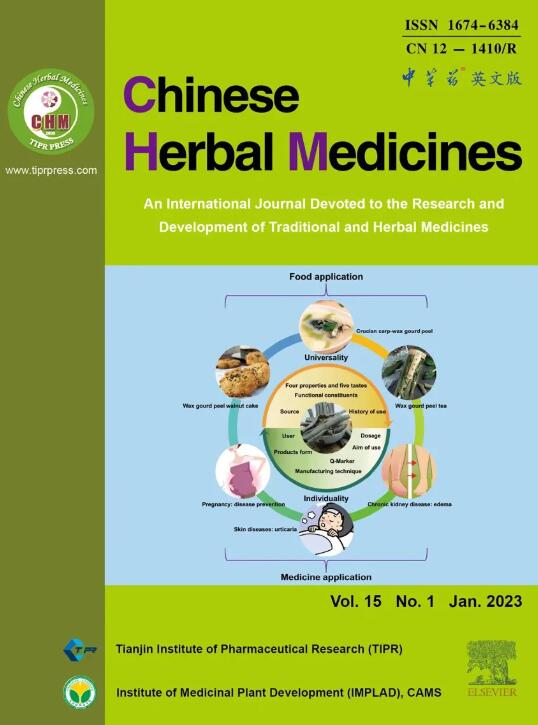Banxia Xiexin Decoction inhibits colitis-associated colorectal cancer development by modulating STAT3 signaling and gut microbiota
IF 8.9
4区 医学
Q1 CHEMISTRY, MEDICINAL
引用次数: 0
Abstract
Objective
To investigate the therapeutic effects of Banxia Xiexin Decoction (BXD), a herbal medicine formula, on inflammation and the imbalance of the gut microbiota in a rat model of colorectal cancer (CRC) induced by azoxymethane (AOM) /dextran sulfate sodium (DSS).
Methods
A total of 75 male C57BL/6 mice were randomly divided into five groups: normal control group (NC), model group (MODEL), low-dose BXD treatment group (L-BXD), high-dose BXD treatment (H-BXD) group and MS treatment group (MS). BXD and MS were used in CRC mice at the doses of 3.915 g/kg, 15.66 g/kg, 0.6 g/kg for 3 weeks consecutively. Histopathological changes in the colon were observed using hematoxylin-eosin (HE) staining. The content of inflammatory factors in serum was detected by an enzyme-linked immunosorbent assay (ELISA), and the expression of mRNA and protein of genes related to immunity, apoptosis, inflammation, and inflammatory factors was evaluated. Changes in the intestinal flora of mouse fecal were determined based on high-throughput sequencing of the 16S rRNA microbial gene.
Results
Compared to the model group, the low-dose BXD and high-dose BXD groups decreased the number of colon tumors, reversed weight loss, and shortened colon length of mice. The pathological examination showed that BXD alleviated the malignancy of intestinal tumors. It also suppressed signal transducer and activator of transcription 3 (STAT3), matrix metalloproteinase-9 (MMP-9), and transforming growth factor beta 1 (TGF-β1) expression, while increasing the expression of the tight junction protein ZO-1 in colon tissues. Additionally, the levels of key pathway proteins involved in inflammation (phosphorylated-STAT3, Bcl-2, COX-2) and cell cycle regulatory molecules (c-Myc and PCNA) were reduced. According to 16S rRNA sequence analysis, BXD enhanced the relative abundance of potentially beneficial bacteria, while that of cancer-related bacteria decreased.
Conclusion
BXD plays a preventive role in developing colorectal cancer; its mechanisms are related to the inhibition of inflammation and tumor proliferation, as well as maintenance of intestinal homeostasis.
半夏泻心汤通过调节 STAT3 信号和肠道微生物群抑制结肠炎相关性结直肠癌的发展
目的探讨半夏泻心汤(BXD)对偶氮氧甲烷(AOM) /葡聚糖硫酸钠(DSS)诱导的大鼠结直肠癌(CRC)模型炎症及肠道菌群失衡的治疗作用。方法将75只雄性C57BL/6小鼠随机分为正常对照组(NC)、模型组(model)、BXD低剂量治疗组(L-BXD)、BXD高剂量治疗组(H-BXD)和MS治疗组(MS)。BXD和MS分别以3.915 g/kg、15.66 g/kg、0.6 g/kg的剂量给药结直肠癌小鼠,连续3周。采用苏木精-伊红(HE)染色观察结肠组织病理学变化。采用酶联免疫吸附试验(ELISA)检测血清中炎症因子的含量,并检测免疫、细胞凋亡、炎症和炎症因子相关基因mRNA和蛋白的表达。基于16S rRNA微生物基因的高通量测序,确定了小鼠粪便肠道菌群的变化。结果与模型组比较,BXD低剂量组和高剂量组小鼠结肠肿瘤数量减少,体重减轻,结肠长度缩短。病理检查显示BXD能减轻肠道肿瘤的恶性。抑制信号传导和转录激活因子3 (STAT3)、基质金属蛋白酶-9 (MMP-9)、转化生长因子β1 (TGF-β1)的表达,增加结肠组织紧密连接蛋白ZO-1的表达。此外,参与炎症的关键途径蛋白(磷酸化的stat3, Bcl-2, COX-2)和细胞周期调节分子(c-Myc和PCNA)的水平降低。根据16S rRNA序列分析,BXD提高了潜在有益菌的相对丰度,而降低了癌症相关菌的相对丰度。结论bxd对大肠癌的发生具有预防作用;其机制与抑制炎症和肿瘤增殖以及维持肠道内稳态有关。
本文章由计算机程序翻译,如有差异,请以英文原文为准。
求助全文
约1分钟内获得全文
求助全文
来源期刊

Chinese Herbal Medicines
CHEMISTRY, MEDICINAL-
CiteScore
4.40
自引率
5.30%
发文量
629
审稿时长
10 weeks
期刊介绍:
Chinese Herbal Medicines is intended to disseminate the latest developments and research progress in traditional and herbal medical sciences to researchers, practitioners, academics and administrators worldwide in the field of traditional and herbal medicines. The journal's international coverage ensures that research and progress from all regions of the world are widely included.
CHM is a core journal of Chinese science and technology. The journal entered into the ESCI database in 2017, and then was included in PMC, Scopus and other important international search systems. In 2019, CHM was successfully selected for the “China Science and Technology Journal Excellence Action Plan” project, which has markedly improved its international influence and industry popularity. CHM obtained the first impact factor of 3.8 in Journal Citation Reports (JCR) in 2023.
 求助内容:
求助内容: 应助结果提醒方式:
应助结果提醒方式:


